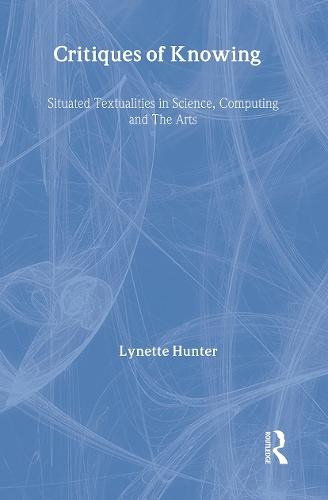Full Product Details
Author: Lynette Hunter
Publisher: Taylor & Francis Ltd
Imprint: Routledge
Dimensions:
Width: 15.60cm
, Height: 2.60cm
, Length: 23.40cm
Weight: 0.544kg
ISBN: 9780415192569
ISBN 10: 0415192560
Pages: 256
Publication Date: 11 February 1999
Audience:
College/higher education
,
General/trade
,
Tertiary & Higher Education
,
General
Format: Hardback
Publisher's Status: Active
Availability: In Print

This item will be ordered in for you from one of our suppliers. Upon receipt, we will promptly dispatch it out to you. For in store availability, please contact us.
Reviews
'This is a dazzling book; in scope, in depth, in the originality of its approach and in the crisp confidence of its style. Its place in the study of particular disciplines is clear, but in the broader picture, it is difficult to think of anyone engaged in intellectual work at the end of the twentieth century who would not be the better for reading it.' - Convergence: The Journal of Research into New Media Technologies 'a much needed lexicon for scholars to draw upon.' - C.Jan Swearingen, Texas A & M University
'This is a dazzling book; in scope, in depth, in the originality of its approach and in the crisp confidence of its style. Its place in the study of particular disciplines is clear, but in the broader picture, it is difficult to think of anyone engaged in intellectual work at the end of the twentieth century who would not be the better for reading it.' - Convergence: The Journal of Research into New Media Technologies 'a much needed lexicon for scholars to draw upon.' - C.Jan Swearingen, Texas A & M University
Reading Critiques of Knowing is like looking into a kaleidoscope, where bright fragments are set in mirrors and new and beautiful patterns come from. One of my special pleasures in reading her are the delicious asides; these are veru light very fast, Lynetter Hunter makes some devastating theoretical reflections, and the text races down the page<br>. <br>-Hilary Rose, author of Love, Power and Knowledge <br> This erudite, elegantly written book engages provocatively with questions at the forefront of scholarship in the humanities at the end of the twentieth century. It has the rare virtue of connecting these questions, convincingly, to analogous issues in the cultural studies of science. Lynette Hunter develops an innovative conceptual apparatus that will offer new resources to scholars working in a widely disparate range of disciplines and subject matters. It is a fine, accessible text<br>. <br>-Lorraine Code, author or Rhetorical Spaces <br>
Reading Critiques of Knowing is like looking into a kaleidoscope, where bright fragments are set in mirrors and new and beautiful patterns come from. One of my special pleasures in reading her are the delicious asides; these are veru light very fast, Lynetter Hunter makes some devastating theoretical reflections, and the text races down the page. -Hilary Rose, author of Love, Power and Knowledge This erudite, elegantly written book engages provocatively with questions at the forefront of scholarship in the humanities at the end of the twentieth century. It has the rare virtue of connecting these questions, convincingly, to analogous issues in the cultural studies of science. Lynette Hunter develops an innovative conceptual apparatus that will offer new resources to scholars working in a widely disparate range of disciplines and subject matters. It is a fine, accessible text. -Lorraine Code, author or Rhetorical Spaces
Author Information
Lynette Hunter is Professor of the History of Rhetoric at University of Leeds. She is the author of several books including Rhetorical Space, Outsider Notes: Feminist Approaches to Ideology, Modern Allegory and Fantasy and Writing/Reading, and Publishing



